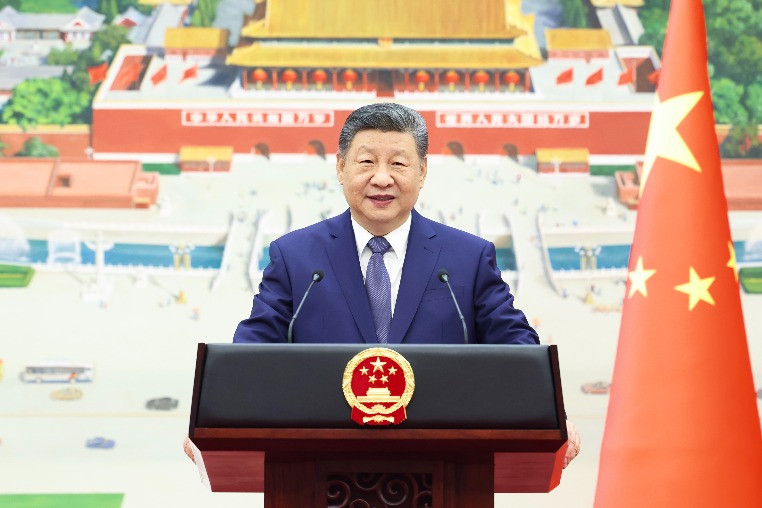Down time
It is the West that has peaked, not China


The world economy perpetually maintains a hierarchical stratification of countries' economic positions, but it is dynamic. That is to say, although not easy, it is possible for countries to change positions within its structural morphology, by taking advantage of global capital mobility and the relocation of production. China's ascent as a new economic force since the 1980s has injected fresh vitality into the world economy, embodying the cyclical nature of global economic leadership.
Historically, shifts in global power dynamics have often led to the emergence of new world orders, disorders, or reordered systems. These changes are typically fueled by the rise of new powers challenging established ones, and the resulting frictions between them can reshape the international landscape. The rise of China, the China-US rivalry, the global power rebalance caused by the COVID-19 pandemic, the US withdrawal from Afghanistan, the Russian-Ukraine crisis, China's role in restoring the diplomatic relations between Iran and Saudi Arabia, and the renewed Israel-Palestine war are good examples of "pivotal moments" in the transformation of the world order and reordering process. History shows that the decline of dominant powers often stems from the incumbent power's failure to adapt to shifts in the global economy and international dynamics triggered by the emergence of new powers.
China's robust economic growth over the past few decades has had a profound impact on the world economy. China's policies regarding finance, currency, trade, military security, environmental issues, resource management, food security, and commodity prices have sparked considerable debate and scrutiny. This is because shifts in China's supply and demand can have ripple effects on global prices, prompting adjustments in other countries' economies. As a result, China's market size and integration with the world economy have contributed to the West's "uncertainty "about its own economic dominance. China is increasingly seen to have the quality of the United States, as an "indispensable country".
Since 2013, China has proposed a number of global initiatives and these initiatives are perceived by the West as China's blueprint for an "alternative world order" or a grand vision of a world order with Chinese characteristics. It is hard for the West to accept the fact that for the past several hundreds of years the world order has always been dominated by the West with circles of hegemons within West, and now the new ordering power is a non-Western power.
The above are the backdrops against the "peak China" hype stimulated by mainstream Western media and academic outlets. The promotion of the notion of "peak China" reflects the existing powers' psychological fear, emotional hysteria and denial of the success and rise of a non-Western power.
The modern history of relations between China and the West is one of persistent Western efforts to engage China and to change its society and behavior in a way it desires. Early Western missionaries from Europe and America attempted but failed in their efforts of converting China into a Christian country. Despite the willingness of China to study Western technologies and ideas, it remained firmly attached to its own historical and cultural traditions. The "peak China" hype should be seen as a form of cognitive warfare by the West, aiming at influencing global perceptions and conveying the message that China's global ascent under its political system is not sustainable.
One could argue that while traditional political science and international relations theories retain their relevance, they might fall short in times of imperial decline and shifts in the global order. Therefore, supplementing them with disciplines such as psychology, psychiatry, religion, cultural studies, and eschatology could enhance our understanding.
For instance, one thing we repeatedly see these years is the West's psycho-political projections of its own dark sides onto others. It consistently blames others for doing what it does itself to a much larger degree and, thereby, cleans itself from the possibility that the West itself has done, or is doing, anything wrong. Here easily enters paranoia — everybody else is ganging up and is out to get us.
Such a self-view and worldview holds little significance. Despite a decline in its economic, cultural, political and diplomatic influence, the United States remains unrivaled in military strength globally. It strives to uphold its position of world dominance through the hundreds of military bases and its invented exceptionalist "rules-based" order.
The declining power tends to perceive itself as prevailing against these challenges by leveraging its media industry. These platforms consistently amplify accusations against Xinjiang, Hong Kong, Taiwan, human rights violations, authoritarianism, and other related issues as part of a broader strategy of global propaganda warfare against China. The mantra of decline is: we have nothing to learn, and we only teach. This mindset largely accounts for the repeated predictions, more akin to wishful thinking, that China's rise has already "peaked".In such times, the most prudent strategy for emerging powers is to exercise patience, and understanding, perhaps even empathy, while refraining from responding to provocations. The reality today is that it is the West that has peaked, not the Global East and South.
Li Xing is a Yunshan leading scholar and a distinguished professor at Guangdong Institute for International Strategies, and a professor of international relations at Aalborg University, Denmark. Jan Oberg is a former professor and co-founder and director of the independent Transnational Foundation for Peace and Future Research, Sweden. The authors contributed this article to China Watch, a think tank powered by China Daily. The views do not necessarily reflect those of China Daily.
Contact the editor at editor@chinawatch.cn.


































